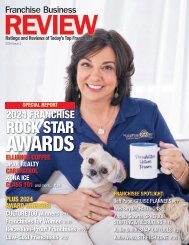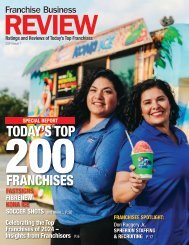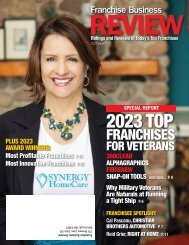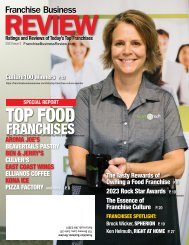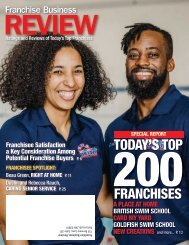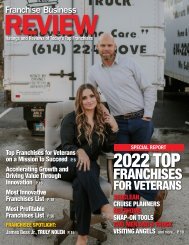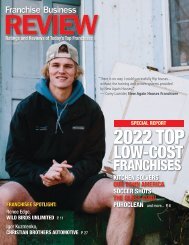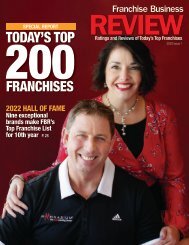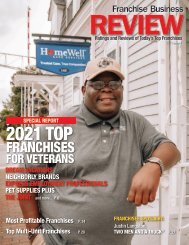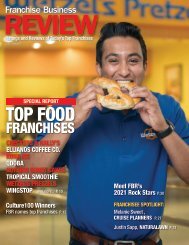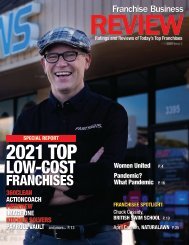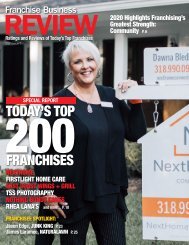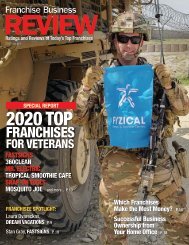FBR Emerging Franchises 2015
A look at the top brands that have been franchising since 2010 or later. Ratings are based on franchisee satisfaction research. Only the brands with happy franchisees are included!
A look at the top brands that have been franchising since 2010 or later. Ratings are based on franchisee satisfaction research. Only the brands with happy franchisees are included!
You also want an ePaper? Increase the reach of your titles
YUMPU automatically turns print PDFs into web optimized ePapers that Google loves.
SPECIAL REPORT: <strong>Emerging</strong> <strong>Franchises</strong><br />
Newer Can Be Better<br />
A Look at the Strongest Up-and-Coming Franchise Brands<br />
There are a variety of reasons people seeking<br />
to be self-employed purchase a franchise<br />
instead of creating a business from scratch.<br />
The primary one is that franchises tend to<br />
have a higher success rate than start-ups do<br />
because they offer a blueprint for success—<br />
proven systems and ongoing support.<br />
“After working on Wall Street for 23 years,<br />
I had the opportunity to accept a severance<br />
package. I had seen too many Wall Street guys<br />
in transition waiting around for another job,<br />
often for a long time, and knew I wanted<br />
to have my own business. A career coach said<br />
that starting one from scratch fails 90% of the<br />
time and that franchises had a much higher<br />
success rate because of the support structure.<br />
He gave me four franchises to look at. I threw<br />
out two immediately and went to the discovery<br />
day for the other two. When I met the CEO of<br />
101 Mobility, I knew it was the franchise for<br />
me for several reasons. With 10,000 people a<br />
day turning 65 the marketplace is huge, the<br />
size of the territories and price point really<br />
appealed to me, and I’d be able to give back<br />
to people who are facing desperate times,” says<br />
John Michielini, who opened his 101 Mobility<br />
franchise in August of 2013 in his New<br />
York territory.<br />
“At first I thought I’d add a mosquito and<br />
pest control division to my existing lawn care<br />
business, Southern Lawn,” says Steve Clark,<br />
who purchased his Tennessee based Mosquito<br />
Joe franchise in January 2014. “I’m glad I didn’t<br />
because it took me eight years to reach $250<br />
thousand in sales with Southern Lawn and we<br />
plan to hit that same figure with Mosquito Joe<br />
this year. It’s clear that Mosquito Joe’s existing<br />
systems trump me trying to figure out what to<br />
do on my own. In fact, I’m now applying them<br />
to Southern Lawn.”<br />
“It’s a lot of work to have a franchise, but<br />
it would have been even more work if we tried<br />
to create a similar business on our own and<br />
it would have cost more, since the tools and<br />
infrastructure wouldn’t be there for us,” says<br />
Judy and Reed Alewel, owners of Pinot’s Palette in Las Vegas, at their Phantom of the Opera themed event.<br />
<strong>Franchises</strong> tend to have a higher success rate<br />
than start-ups do because they offer a blueprint<br />
for success.<br />
Pinot’s Palette franchisee, Reed Alewel. He<br />
and his wife, Judy, left well-paying corporate<br />
jobs to open their two franchise locations in<br />
the Las Vegas metropolitan area.<br />
ESTABLISHED VS. EMERGING FRANCHISES:<br />
THE EARLY BIRD GETS THE WORM<br />
Franchisees that invest in a newer concept<br />
tend to be less risk averse than those who are<br />
only interested in franchises that have been<br />
around longer. They often see opportunity<br />
where others see risk and have confidence in<br />
themselves and their ability to make things<br />
work within a franchise system that may<br />
still be working out its kinks. The potentially<br />
greater risk franchisees of emerging franchise<br />
concepts take on is often offset by their ability<br />
to obtain larger territories and more locations<br />
for lower fees than those who come on board<br />
later.<br />
“Franchisees who invest in an emerging<br />
franchise get in on the ground floor, pay lower<br />
start-up costs and are part of creating the<br />
brand model,” says Amy Wasney, Director of<br />
Operations at Men In Kilts Window Cleaning.<br />
“As an emerging franchise we need to<br />
ensure that not one franchisee falls by the<br />
wayside. We do so by listening to our franchisees<br />
input and ideas for better growth.<br />
Once a franchise system gets larger, these<br />
For more information on this report, visit: www.FranchiseBusinessReview.com | 3




